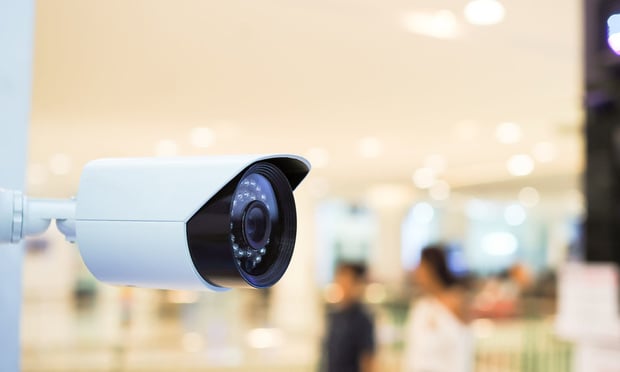'The Sanction of Spoliation Is Devastating': Ruling on Slip-and-Fall Video Could Raise Stakes for Evidence Preservation
The Pennsylvania Supreme Court has declined to review a Superior Court ruling that a grocery store spoliated evidence when it deleted portions of a surveillance video the plaintiff had requested in a slip-and-fall case, letting stand a precedential decision that one civil litigator said should give pause to business owners and lawyers on both sides of the courtoom aisle.
March 05, 2020 at 02:00 PM
6 minute read
 Photo: Shutterstock
Photo: Shutterstock
The Pennsylvania Supreme Court has declined to review a Superior Court ruling that a grocery store spoliated evidence when it deleted portions of a surveillance video the plaintiff had requested in a slip-and-fall case, letting stand a precedential decision that one civil litigator said should give pause to business owners and lawyers on both sides of the courtroom aisle.
Last March, in Marshall v. Brown's IA, a three-judge Superior Court panel ordered a new trial for plaintiff Harriet Marshall because the Philadelphia Court of Common Pleas judge who oversaw her first trial failed to give the jury an adverse inference instruction based on defendant ShopRite's spoliation of evidence.
According to the panel's March 27, 2019, published opinion, Marshall slipped on water and fell in the produce aisle of the Island Avenue ShopRite in Philadelphia, aggravating a preexisting injury to her hip and back. About two weeks later, ShopRite received a letter from Marshall's attorney requesting footage of the six hours before and the three hours after Marshall's fall.
The letter, according to the opinion, warned, "'If any of the above evidence exists, and you fail to maintain same until the disposition of this claim, it will be assumed that you have intentionally destroyed and/or disposed of evidence. Please be advised that you are not permitted, and are in no position, to decide what evidence plaintiff would like to review for this case. Accordingly, discarding any of the above evidence will lead to an adverse inference against you in this matter.'"
ShopRite, however, preserved only about 37 minutes before and 20 minutes after Marshall's fall, the court said.
The case proceeded to a trial and a jury found in favor of the defense. Marshall appealed, arguing that she was prejudiced by the trial court's refusal to give a spoliation instruction to the jury.
The appeals panel, led by Judge Mary Jane Bowes, agreed, finding that the letter from Marshall's attorney had "placed ShopRite on notice to preserve the video surveillance prior to and after the fall as it was arguably relevant to impending litigation" and that ShopRite had "consciously decided to preserve only a fraction of the video requested because, as a 'rule of thumb,' it usually retained only 20 minutes of video prior to a fall, and 20 minutes after."
"ShopRite's conduct herein constituted spoliation," Bowes said. "We agree with Ms. Marshall that the video surveillance tape depicting the events in the several hours prior to her fall was relevant for showing far more than the offending substance on the floor. Additional probative value lay in demonstrating what steps, if any, ShopRite and its employees took to make the premises reasonably safe for business visitors such as Ms. Marshall in the hours leading up to the fall. Arguably, such evidence was relevant to showing knowledge, constructive notice, and a lack of care for the safety of invitees."
Bowes was joined by Judges Victor Stabile and Maria McLaughlin.
The appeals panel also took issue with the trial court's determination that ShopRite did not spoliate evidence because it did not act in bad faith.
"Spoliation may be negligent, reckless, or intentional; a party's good or bad faith in the destruction of potentially relevant evidence goes to the type of sanction that should be imposed, not whether a sanction is warranted," Bowes said, adding, "Ms. Marshall asked the court for the least severe spoliation sanction, an adverse inference instruction. On the facts herein, it was warranted, and the court abused its discretion in refusing the charge."
Counsel for Marshall, Marc Greenfield of Spear Greenfield in Philadelphia, could not be reached for comment on the Supreme Court's March 3 allocatur denial.
Thomas Bradley of McBreen & Kopko in Philadelphia represented Brown's IA, which owns the Island Avenue ShopRite. He also could not be reached for comment.
Litigator Mark DiAntonio of McCann Law in Philadelphia, who was not involved in Marshall but has previously written about the potential ramifications of the case, said he was surprised the Supreme Court denied allocatur because the Superior Court's ruling is likely to make discovery more arduous in injury cases and create more work for trial courts.
Philadelphia's Discovery Court Program, for example, may see more activity, as parties wrangle over the scope of surveillance video requests.
"The message that's sent [by the Marshall decision] is 'when in doubt, make a really broad request and make the camera owner either comply or refuse or give something less than everything you're asking for and then go to Discovery Court and state your case,'" DiAntonio said. "I can see a lot more trips to Discovery Court as a result of that. There's really no incentive for the requester to limit their request."
And while plaintiffs are often the ones seeking video evidence in these cases, there are sometimes circumstances where the defense is the requester, so the Marshall ruling cuts both ways, according to DiAntonio.
DiAntonio also noted that many of these requests are made pre-litigation, meaning the owner of the video footage won't have the benefit of asking a judge or discovery master to define the parameters. That means business owners are going to need to be more diligent about preserving video evidence when they're aware of an incident, such as a slip-and-fall, that could potentially give rise to litigation, DiAntonio said.
The Marshall decision, he added, also reinforces the need for businesses to have "a well-thought-out video retention policy and to have somebody in charge of it who can explain why you came up with the policy and how you methodically follow it."
"That's going to put you in a much stronger position if, ultimately, you have to explain why you didn't save what you think is an onerous amount of video footage," he said.
Being prepared for discovery requests of video evidence could mean the difference between winning and losing a case, DiAntonio said.
"The sanction of spoliation is devastating," he said. "If you don't preserve video evidence, the presumption can be that it happened just like the person said it did. How do you overcome that?"
This content has been archived. It is available through our partners, LexisNexis® and Bloomberg Law.
To view this content, please continue to their sites.
Not a Lexis Subscriber?
Subscribe Now
Not a Bloomberg Law Subscriber?
Subscribe Now
NOT FOR REPRINT
© 2025 ALM Global, LLC, All Rights Reserved. Request academic re-use from www.copyright.com. All other uses, submit a request to [email protected]. For more information visit Asset & Logo Licensing.
You Might Like
View All


Stevens & Lee Hires Ex-Middle District of Pennsylvania U.S. Attorney as White-Collar Co-Chair
3 minute read
Judge Tanks Prevailing Pittsburgh Attorneys' $2.45M Fee Request to $250K
5 minute readTrending Stories
- 1Ex-Kline & Specter Associate Drops Lawsuit Against the Firm
- 2Am Law 100 Lateral Partner Hiring Rose in 2024: Report
- 3The Importance of Federal Rule of Evidence 502 and Its Impact on Privilege
- 4What’s at Stake in Supreme Court Case Over Religious Charter School?
- 5People in the News—Jan. 30, 2025—Rubin Glickman, Goldberg Segalla
Who Got The Work
J. Brugh Lower of Gibbons has entered an appearance for industrial equipment supplier Devco Corporation in a pending trademark infringement lawsuit. The suit, accusing the defendant of selling knock-off Graco products, was filed Dec. 18 in New Jersey District Court by Rivkin Radler on behalf of Graco Inc. and Graco Minnesota. The case, assigned to U.S. District Judge Zahid N. Quraishi, is 3:24-cv-11294, Graco Inc. et al v. Devco Corporation.
Who Got The Work
Rebecca Maller-Stein and Kent A. Yalowitz of Arnold & Porter Kaye Scholer have entered their appearances for Hanaco Venture Capital and its executives, Lior Prosor and David Frankel, in a pending securities lawsuit. The action, filed on Dec. 24 in New York Southern District Court by Zell, Aron & Co. on behalf of Goldeneye Advisors, accuses the defendants of negligently and fraudulently managing the plaintiff's $1 million investment. The case, assigned to U.S. District Judge Vernon S. Broderick, is 1:24-cv-09918, Goldeneye Advisors, LLC v. Hanaco Venture Capital, Ltd. et al.
Who Got The Work
Attorneys from A&O Shearman has stepped in as defense counsel for Toronto-Dominion Bank and other defendants in a pending securities class action. The suit, filed Dec. 11 in New York Southern District Court by Bleichmar Fonti & Auld, accuses the defendants of concealing the bank's 'pervasive' deficiencies in regards to its compliance with the Bank Secrecy Act and the quality of its anti-money laundering controls. The case, assigned to U.S. District Judge Arun Subramanian, is 1:24-cv-09445, Gonzalez v. The Toronto-Dominion Bank et al.
Who Got The Work
Crown Castle International, a Pennsylvania company providing shared communications infrastructure, has turned to Luke D. Wolf of Gordon Rees Scully Mansukhani to fend off a pending breach-of-contract lawsuit. The court action, filed Nov. 25 in Michigan Eastern District Court by Hooper Hathaway PC on behalf of The Town Residences LLC, accuses Crown Castle of failing to transfer approximately $30,000 in utility payments from T-Mobile in breach of a roof-top lease and assignment agreement. The case, assigned to U.S. District Judge Susan K. Declercq, is 2:24-cv-13131, The Town Residences LLC v. T-Mobile US, Inc. et al.
Who Got The Work
Wilfred P. Coronato and Daniel M. Schwartz of McCarter & English have stepped in as defense counsel to Electrolux Home Products Inc. in a pending product liability lawsuit. The court action, filed Nov. 26 in New York Eastern District Court by Poulos Lopiccolo PC and Nagel Rice LLP on behalf of David Stern, alleges that the defendant's refrigerators’ drawers and shelving repeatedly break and fall apart within months after purchase. The case, assigned to U.S. District Judge Joan M. Azrack, is 2:24-cv-08204, Stern v. Electrolux Home Products, Inc.
Featured Firms
Law Offices of Gary Martin Hays & Associates, P.C.
(470) 294-1674
Law Offices of Mark E. Salomone
(857) 444-6468
Smith & Hassler
(713) 739-1250





